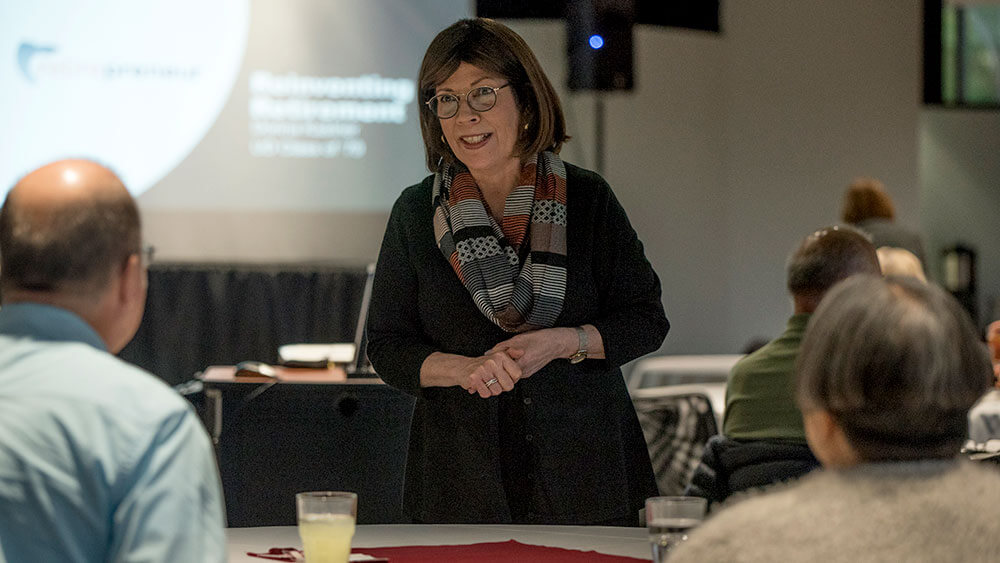
Donna Kastner, founder of Retirepreneur, speaks at a workshop for professionals in their 50s and 60s who want to gradually downshift their careers. (Courtesy Retirepreneur)
Donna Kastner, founder of Retirepreneur, an Ohio-based startup that helps retiring Baby Boomers pursue entrepreneurship, didn’t have to look far for an example of how transitioning from a full-time job to a part-time gig works. She is her brand.
Kastner, who is 61 and happy to share her age, started Retirepreneur in 2016 after working more than 15 years in the events industry, including with her own consulting firm, Enlighten 123 Inc. Through articles, podcasts, videos, and most recently live workshops, Retirepreneur helps connect professionals in their 50s and 60s who want to gradually downshift their careers while still doing the work they love in hopes of having a more rewarding retirement.
“I think that with people living longer and more attention to wellness and exercise and all, 60-something doesn’t look like what it used to look like,” Kastner told Convene.
She sees her target as someone with professional skills who enjoys what they do “but they don’t want to work full throttle.” They also like the idea of making possibly an additional $30,000 in retirement, but in a part-time capacity as a consultant. “That can make a world of difference,” she said.
More a collaborative community than a post-career coaching service, Retirepreneur leverages the expertise of its diverse group of professionals to help each other through the transition to post-work life, which Kastner said should begin before retirement. Start thinking about the transition
Related: Patti Temple Rocks Hopes Book Will Spark Conversations About Ageism
“while your network is active,” she said, so you have some “big-picture ideas” of what kind of consulting, writing, or other work you want to pursue when the time comes.
“Me, I can’t imagine not working,” Kastner said, echoing the sentiments of many professionals in their 50s, 60s, and even 70s. She’s now leveraging her events industry background “in ways I never thought about” — especially around education experience and event design — to help build the Retirepreneur community.
Kastner initially had the idea for the concept in 2008, when a dip in the U.S. economy resulted in many well-compensated Baby Boomers becoming targets for layoffs. At the time she was a job coach, and understood how difficult it was at a certain age to find another job.
“And I thought, ‘Okay, so you could try to get a job and then this [layoff] might happen again, or you could hire yourself and start your own business,’” she recalled. She secured the retirepreneur.com URL in 2009, but joined a consulting firm and put it on the back burner.
Kastner already had experience starting her own business, learning early in her career that entrepreneurship was “part of my DNA.” A high-school band director in the 1980s, she took a sabbatical from teaching while she and her husband started their family. After buying an IBM PC Junior, she also started a home-based typesetting business that eventually grew to employ other stay-at-home moms and resulted in Kastner “making way more than I would as a teacher.”
Fast forward to 2016: Kastner revived Retirepreneur when she saw a need to raise awareness about the “Modern Elder” — Chip Conley’s term — who might be near or at retirement age but wants to keep working. Because age is the least protected category of work discrimination, it still can be difficult to either keep a job or get a new one at a certain age, she said. Many times, older workers are ushered out the door despite having plenty left to contribute. Kastner believes organizations can benefit from having seasoned veterans working side-by-side with younger employees — or in the events space with younger attendees. This intergenerational collaboration at work or conferences brings together diverse perspectives that can result in breakthrough ideas, she said.
“I’m trying to help advance this faster,” she said, “because I don’t think it’s advancing fast enough.”
Curt Wagner is a Convene associate editor.
RELATED: New Study Finds Baby Boomers Staying in the Workforce at Levels Not Seen in Over 50 Years
Test Time
- Earn one clock hour of certification credit.
- Once you’ve finished reading the June Convene age discrimination stories, read an Experient blog post, “Why the Over-50 Crowd Still Matters for Events,” by Donna Kastner.
- To earn certification clock hours, visit Convene’s CMP Series page to answer questions about information contained in this CMP Series article and the additional material.
The Certified Meeting Professional (CMP) is a registered trademark of the Events Industry Council.
